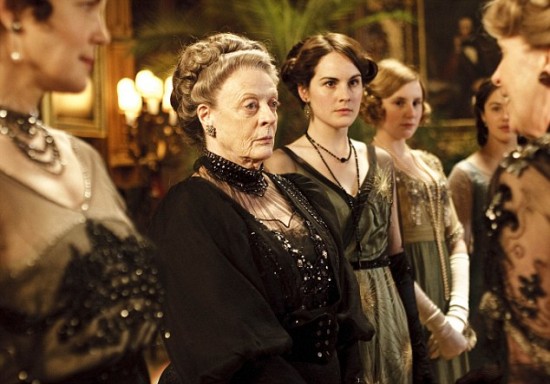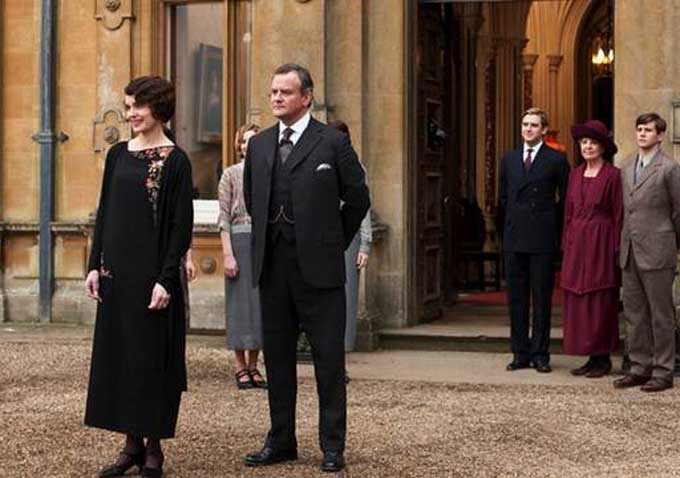By providing your information, you agree to our Terms of Use and our Privacy Policy. We use vendors that may also process your information to help provide our services. This site is protected by reCAPTCHA Enterprise and the Google Privacy Policy and Terms of Service apply.
The Final Season of ‘Downton Abbey’: Why Deciding to End Well Is So Important

 READ MORE: Review: ‘Downton Abbey’ Season 5 Episode 9 Celebrates Christmas With Booze and Intrigue
READ MORE: Review: ‘Downton Abbey’ Season 5 Episode 9 Celebrates Christmas With Booze and Intrigue
For those who follow such things, today’s formal announcement that the sixth season of “Downton Abbey” would be its last was not a huge surprise. Rumors of the news have been building for weeks now, initially kicked off by comments from Dame Maggie Smith earlier this year, and given the lack of Season 7 contracts and the other projects creator Julian Fellows has in place. But it’s still an important announcement, because now that the speculation is over, “Downton” can devote itself fully to ending well. And these days, that’s the most important and valuable thing in determining a show’s legacy.
Whether you interpret the news as “Downton” going out at the top of its game, or a sign that it’s overstayed its welcome, determining an ending in advance is one of the strongest moves this show — or any show — can make.
Premiering in 2010, “Downton Abbey” became a global hit in its second season, with international audiences falling hard for the show’s blend of romance, intrigue, class struggles and the dry wit of Dame Maggie Smith. When the show concludes this fall in the UK (in the US, Season 6 will likely premiere on PBS in January 2016), it’ll do so with countless award nominations and wins in both countries.
An important thing to remember about “Downton Abbey” is that in the UK television ecosystem, it’s an aberration. Outside of long-running soaps and crime procedurals, it’s quite rare for a drama series to not only last for more than a few seasons, but do so with most of the cast and creative team intact. When “Downton” ends, it’ll go out with creator Julian Fellows having written every episode of the series, and breakout stars like Hugh Bonneville and Michelle Dockery on screen.
In an interview regarding his upcoming series “Cucumber/Banana,” writer Russell T. Davies (who created the original “Queer As Folk” and led the modern relaunch of “Doctor Who”) told Indiewire that “You have to just congratulate Julian Fellowes on what an extraordinary job he’s done. It’s a mammoth of an empire. Any British show that does that paves the way for the rest of us, so well done to that man.”

There were special considerations with pushing the life of “Downton” much further — while the show began, time-wise, in the year 1912, its fifth season ended in the year 1924. “We almost certainly couldn’t go too much further than the 1920s because when we cast them originally, the actors were the right ages for their characters,” “Downton Abbey” executive producer Gareth Neame said to Indiewire via phone. “Because the show has moved more quickly than real time, the actors, all that continuity with the ages of the characters — we couldn’t go too much further into the future.”
In addition, on a thematic level ending before “Downton” goes much further into early 20th century history is important, because of how much of the show is focused on the crumbling of the aristocracy. “That’s why we chose that era — because these people were at the height of their powers before the First World War, around about 1912. And they went into a slow decline,” Neame said.
“The First World War changed that way of life. It made Britain much more democratic, the horrors of that world and the number of people that were killed. And through the 1920s these people became very heavily taxed… The whole way of life we depicted started to crumble and you see it in old-world America as well. We will be ending the show at the time when the way of life we depicted was really coming to an end anyway.”
It’s becoming increasingly rare for a television show not to end on its own terms — at the very least getting a chance to wrap up a few loose ends. Just yesterday, HBO’s tragic cancelation of “Looking” came with the promise of a series-ending special; many announcements these days lean towards the reveal not of cancelation, but of “the final season.”
Like “Downton,” that decision is often a mutual one between creators and studios. Critical opinion may vary about “Parks and Recreation‘s” seventh and final season, but what is universally acknowledged is how well the show worked to give its characters strong farewells — every episode was built to bring together a sense of closure.
And that was something driven by creator Michael Schur and star Amy Poehler, who were the ones to pitch NBC the idea that the show end when it did. “We met with… our creative executives, and we all got into a big room,” Schur said at the TCA Winter Press tour this January. “We sort of took a deep breath and said, here is what we would like in a dream world. What we would like is to do Season 7 but a 13 episode season. And they went, ‘That sounds great.’ Then we were like, ‘Oh, that was easy.’ It was just a very natural dovetailing, and it was a pure internally-generated gut feeling of, this feels like the way to go. Then that’s what we got to do.”
Neame promises the same sort of focus for “Downton’s” last hurrah: “It’ll very much be a final season; in that it will have all the usual drama, comedy and romance that people love. But there’s a definite sense that we’re driving towards the ending,” he said. “Where will they all end up? Will Mary find a guy that she loves as much as she loved Matthew? Will Edith ever get a break? All of that stuff will be very much our focus and giving them not necessarily happy endings in every case, but strong endings… We’ve made sure that we will tell the stories we want to tell and wrap them up by the end of this upcoming season.”
Here’s what makes this special: Whether it’s driven by the creators or the networks, the way that finality has been embraced by modern television culture in an attitude that owes a massive thanks to DVD and VOD culture. While the business model of television still largely depends on a show’s initial premiere, the second life that shows experience on Netflix, Amazon Prime and elsewhere is becoming more and more important.
READ MORE: ‘Looking’ Canceled by HBO After 2 Seasons, Though The Story Isn’t Over
After all, imagine this scenario: HBO cancels “Looking” without giving it a chance to wrap up the narrative. A year or two from now, a HBO Now subscriber stumbles across the show in the streaming service’s archives. Said subscriber, after watching the first two seasons and getting hooked, gets angry with the fact that there’s no real ending to the story.

Said hypothetical subscriber’s anger? It’s directed at HBO. This is the scenario that networks have to avoid in building their platforms. In a world where series may end but never really die, where they have more opportunities ever to at least be remembered and rediscovered in the years to come, it’s just bad customer service not to plan for the end.
Everyone currently creating the kind of television worth talking about has a conception that endings are a part of storytelling, and just as important as the beginning. For Neame, what he hopes audiences — British audiences, anyway — take away from the end of “Downton Abbey” is that they have a connection to that world.
“We’ve always been watching it as these characters from 80 years ago but I’d love to get to the end and think, ‘OK, that castle, it still exists. It’s a different kind of place, but it’s still there and it’s a part of where we all come from,'” he said. “If people realize they have a connection to the world we’re portraying, then I’d be really pleased.”
READ MORE: It’s Time To Forgive the ‘How I Met Your Mother’ Series Finale
By providing your information, you agree to our Terms of Use and our Privacy Policy. We use vendors that may also process your information to help provide our services. This site is protected by reCAPTCHA Enterprise and the Google Privacy Policy and Terms of Service apply.



















